Cover Story: Arca Gender-Flips “Quiero Una Chica” Into a Queer Love Song for the Ages
With its heart-tugging strings and earnest vocals, “Machote” defies machismo and offers a much-needed depiction of healthy trans love.
Written by C.S. Harper
Image courtesy of Vibra Music and photo courtesy of Ana Cuba
Visionary, model, mixed media artist, and mastermind behind mindfuck electronic soundscapes are all words that come to mind when describing Alejandra Ghersi, but few Arca fans might think of her as a hopeless romantic. In "Machote," she sheds her femme fatale persona to reveal her delicate essence. Longing for affection from the titular machote (or masculine man), Ghersi declares her passion for him.
A soulful track defined by its R&B-esque rhythm and vulnerable lyrics, “Machote” stands out as a rare romantic gem in Ghersi’s discography. It’s no wonder, then, that the anomaly in the oddball producer’s work is actually a cover. Originally titled “Quiero Una Chica” (“I Want a Girl”) by Colombian duo Latin Dreams, the track made waves in Ghersi’s hometown of Caracas when it dropped in 2003. According to Ghersi, “That was my prepubescent-slash-pubescent upbringing in Venezuela.” As an homage to her childhood and journey discovering her sexuality, Ghersi made her own gender-swapped version of the song in 2020, adding a nostalgic electronic instrumental to tie it all together.
With its steady guitar strums and syncopated percussion, the original track falls within pop-reggae fusion. Singer Mane and rapper Dany take turns delivering verses that list all of their requirements for their dream girl, one “que tenga buenos sentimientos” (“who has good emotions”) and “que se sepa menear” (“who knows how to shake it”). Though the men’s vision for an ideal girl may seem shallow when paired with the airy guitar plucks and catchy hook, Mane expresses his utmost devotion to this woman in the second verse: “Quiero todo de tu cuerpo / Quiero todos tus lamentos / Eres la chica que anhelo” (“I want all of your body / I want all of your lamentations / You’re the girl I desire”). These powerful lines become a central part of Ghersi’s cover, elevating the track beyond its puppy love feel.
Whereas Dany begins the original track by rapping a request for his dream girl to show him her “hoja de vida” (“life resume”), Ghersi cuts to the chase by immediately declaring what she wants: “Quiero un machote / Quiero uno ya” (“I want a masculine man / I want one now”). Instead of the original song’s “Quiero una chica / Quiero una gyal” (“I want a girl / I want a gal”) line, Ghersi changes the gender and indicates a sense of urgency by demanding she have a machote now. She continues changing the gender dynamic in the third line, replacing “Quiero una chica que sea muy especial” (“I want a girl who is very special”) with “Quiero un varón que me sepa tocar” (“I want a boy who knows how to touch me”). By giving a sexual connotation to this lyric, she adds a more adult feel to the song, which was originally more lighthearted and popular among adolescents.
Photo courtesy of Bruno Staub
But Ghersi doesn’t limit her special touch to the song’s lyrics — she also drastically changes the production. Gone are the reggae stylings and in is the producer’s signature electronic flair, but amid the melodramatic synths is one unique, crucial element that makes “Machote” stand out in Ghersi’s discography: the violin. The track’s main melody is led by a violin sample from the Venezuelan songstress’ 2015 song “Wound.” Ghersi calls it “one of the most vanilla, pop, Hollywood chord progressions, but it just touches my heart.” Beyond just tugging at listeners’ heartstrings, the sample holds a deeper meaning. In the same interview, the producer explains, “When I bring up that chord progression, it’s because I’m tuning into something very candid.” And sure enough, “Machote” sees Ghersi at her most vulnerable, as she gives in fully to desire.
To end the track on a powerful note, Ghersi uses the original song’s second verse, rather than ending with the chorus. Specifically, she uses a gender-flipped version of Mane’s declaration of love as a mantra: “Quiero todo de tu cuerpo / Quiero todos tus lamentos / Eres el que más anhelo” (“I want all of your body / I want all of your lamentations / You are the one I desire most”). As the violins begin to overtake Ghersi, her repetition of these lines feel like she is manifesting her ideal man, conveying just how profound her love for this machote is.
Ghersi puts a more mature spin on “Quiero Una Chica,” focusing on the more sexual aspects of desire, along with profound love. By demanding vulnerability from her male partner and showcasing her devotion to him, the singer-producer paints a powerful portrait of trans love that defies machista (chauvinist) expectations. In doing so, Ghersi beautifully amalgamates her child and adult selves into a pure declaration of love.


